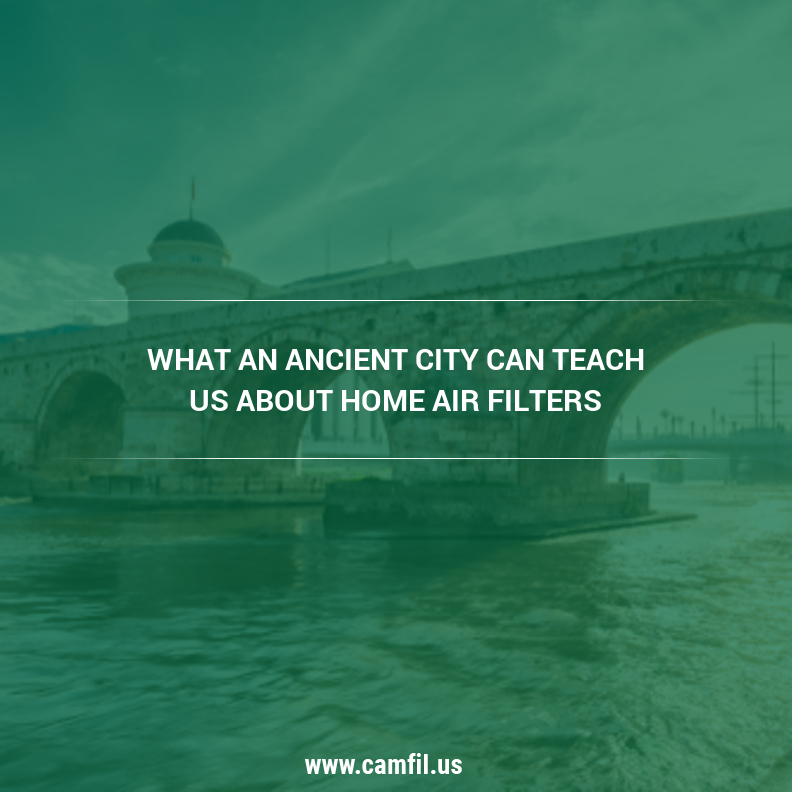Learn why Macedonia is struggling with an outdoor/indoor air quality crisis and why home air filters are needed in cities struggling with air pollution.
With a history dating back to 4,000 B.C., Skopje is one of the oldest cities in the world. Today, the capital of the Republic of Macedonia lives on, but it now faces a problem unlike any it has seen before: air pollution. Indeed, Skopje bears the distinction of having the worst air pollution in all of Europe, forcing citizens to protect themselves with home air filters when staying indoors. In fact, data from the World Health Organization reveals that in 2017, three out of the top 10 cities with the worst air quality are in Macedonia, prompting authorities to take emergency measures to fight uncontrolled air pollution levels in the country. Sadly, these efforts have yet to have any real effect.
It’s estimated that more than 1,300 premature deaths per year happen in the Macedonian capital due to air pollution exposure. Particulate matter (PM) pollution is of special concern to health officials in the country.
Understanding Skopje’s Outdoor and Indoor Air Quality Problems
PM levels in the atmosphere above Skopje have been observed to be more than 10 times higher than the air quality guidelines set by the European Union. This includes coarse particulate matter, or PM10 (10 microns and less in diameter), and fine particulate matter, or PM2.5 (2.5 microns) and below. Fine particle pollution is especially dangerous as these pollutants are small and light enough to stay suspended in the air for hours, often entering homes and buildings through gaps and cracks on doors, walls and windows. In poorly ventilated spaces, PM can dramatically affect indoor air quality.
“Outdoor air pollution infiltrates into buildings,” explains Camfil USA’s Charlie Seyffer, Manager of Marketing & Technical Materials for commercial air filters and 37-year ASHRAE member and active committee participant. “Without appropriate ventilation, it accumulates and can even react with other indoor air pollutants.”
Frequent Inversions in Skopje Underscore Importance of Air Filtration Systems
Macedonian authorities are facing an uphill battle as Skopje’s land-locked and mountainous topography makes it difficult to protect people from air pollution. In the winter months, the winds that would otherwise help disperse the smog that hangs over the city slows down, and a warm layer of air high in the atmosphere pushes down cool and contaminated air into the Skopje valley. This causes air pollution from cars, trucks, power plants, and industrial facilities to build up into a foul-smelling haze that people can actually see, leaving them no choice but to stay indoors under the safety of their air filtration systems.
This phenomenon, known as an atmospheric inversion, happens around the world, sometimes with disastrous results. One such catastrophe occurred in 1948 in Donora, a borough in Pennsylvania, which left 27 people dead in a single weekend and twice as many in the weeks that followed. The incident is known today as the 1948 Donora Smog and was caused by high air pollution emissions from a zinc and steel factory and atmospheric inversion.
Home Air Purifiers a Luxury in Skopje
Air pollution is so rampant in Skopje and the rest of Macedonia that many citizens are forced to buy home air purifiers to prevent themselves and their families from breathing in dirty air. But these devices are a luxury—the average air purifier costs around 400 euros, nearly the average monthly salary.
Sadly, authorities in the country can’t seem to figure out how to solve Macedonia’s air pollution problem. In fact, previous administrations were ousted because of their inability to safeguard both the people and the environment from unregulated industrialization.
The administrations that followed have promised dramatic environmental reform, and while some of these plans are now in action, few, seem to have made any noticeable impact on air quality.
Capturing PM with High Efficiency Filtration Systems
With particulate matter (PM) being the primary pollutant of concern in Skopje, high efficiency filtration systems could very well be the key to protecting people as they stay inside homes, schools, hospitals, and other buildings. PM is mostly generated by fuel combustion cars, trucks, ships, power plants, and industrial facilities—the same factors happening at a massive and uncontrolled scale in Skopje.
High efficiency filters are specifically designed to capture down into the sub-micron range. When attached to an existing HVAC system, a high efficiency filter acts like a sieve, trapping particles carried by the air as it moves through the ductwork. For compromised individuals, those with asthma or other respiratory type ailments, a room air purifier incorporating a HEPA filter is an excellent choice. These units will be at least 99.97% efficient on particles as small as 0.3 micron.
Home Air Purification Systems Are Needed Everywhere
Skopje’s air pollution woes may seem like an outlying case, but the reality is that air pollution is a far more common problem than most people think, affecting major cities in the United States including Los Angeles, Denver, Salt Lake City, and New York. If anything, this proves that air pollution is a universal problem and that everyone needs a home air purification system.
Camfil USA has been the industry leader in commercial air filtration and residential air filters for over 50 years. To learn more about how home air filters can improve indoor air quality in buildings and homes, get in touch with the team here at Camfil USA. You may also browse through our product catalog to explore our solutions yourself.
Media Contact:
Lynne Laake
Camfil USA Air Filters
T: 888.599.6620
E: Lynne.Laake@camfil.com
F: Friend Camfil USA on Facebook
Y: Watch Camfil Videos on YouTube
Source:
The post What Can an Ancient City Teach Us About Home Air Filters? appeared first on Air Filters for Clean Air.

